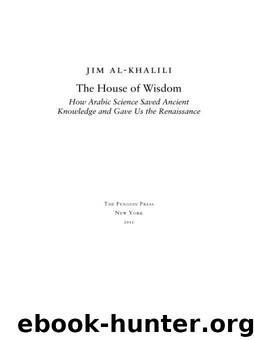The House of Wisdom: How Arabic Science Saved Ancient Knowledge and Gave Us the Renaissance by Jim Al-Khalili

Author:Jim Al-Khalili [Al-Khalili, Jim]
Language: eng
Format: epub
Publisher: Penguin Publishing Group
Published: 2011-03-31T04:00:00+00:00
Among the features in medieval Muslim hospitals that distinguished them from their contemporaries elsewhere were their higher standards of medical ethics. Physicians there treated patients of all religions or ethnicities. They were expected to have obligations towards their patients, regardless of their wealth or background. These ethical standards were first laid down in the ninth century by Ishāq bin Ali al-Rahawi, who wrote The Conduct of a Physician (Adab al-Tabīb), the earliest known Arabic treatise dedicated to medical ethics.
Much of the medical work in Baghdad during the time of al-Rāzi was overseen by Sinān ibn Thābit, the son of the great mathematician and translator Thābit ibn Qurra. Sinan was the equivalent of chief physician and was famously ordered by the Caliph al-Muqtadir to ensure that all physicians sat an examination in order to qualify to practise. They even adopted and adapted to Islamic thought the famous Hippocratic oath.
Al-Rāzi introduced many practical and progressive medical and psychological ideas. He ran the psychiatric ward in the Baghdad hospital at a time when, in the Christian world, the mentally ill were regarded as being possessed by the devil. In fact, he is acknowledged as the father of the fields of psychology and psychotherapy. He also attacked those without medical training who roamed the cities and countryside selling their nostrums and ‘cures’, and criticized them in his book Why People Prefer Quacks and Charlatans to Skilled Physicians, showing his frustration with the way they achieved the fame and fortune that was often denied those with proper medical training. And he wrote of the pity he felt towards those good physicians whose patients would not follow their advice on diet or treatment but then blamed them when they did not recover.
He also made a distinction between curable and incurable diseases, and commented that in the case of advanced cases of cancer and leprosy the physician should not be blamed when he could not cure them. He warned that even highly skilled physicians did not have all the answers, and wrote the aptly titled monograph Even the Most Skilful Physicians Cannot Heal All Diseases.
To maximize their chances of successful diagnosis, he advised all medical practitioners to keep up to date with the latest knowledge by constantly studying medical texts and exposing themselves to new information. On medical ethics and medical training, he borrowed much from the writing of both Hippocrates and Galen, which influenced greatly the medical training manuals he wrote.
As Galen had done before him, and as Ibn Sīna would do a century later, al-Rāzi synthesized all known medicine by sorting and categorizing it into different areas, from eye diseases to gastro-intestinal complaints, from dietary advice to case studies. So comprehensive were his working files that they were assembled posthumously into one of the greatest medical texts ever written, al-Kitab al-Hāwi. It is still the largest Arabic medical textbook, filling twenty-three volumes in a modern printing. It now survives only in Latin, as Liber continens, but it became one of the most highly respected and frequently used medical textbooks in Europe for several centuries.
Download
This site does not store any files on its server. We only index and link to content provided by other sites. Please contact the content providers to delete copyright contents if any and email us, we'll remove relevant links or contents immediately.
| Africa | Americas |
| Arctic & Antarctica | Asia |
| Australia & Oceania | Europe |
| Middle East | Russia |
| United States | World |
| Ancient Civilizations | Military |
| Historical Study & Educational Resources |
Empire of the Sikhs by Patwant Singh(23084)
The Wind in My Hair by Masih Alinejad(5095)
Rise and Kill First by Ronen Bergman(4788)
The Templars by Dan Jones(4689)
The Rape of Nanking by Iris Chang(4211)
12 Strong by Doug Stanton(3549)
Blood and Sand by Alex Von Tunzelmann(3203)
Babylon's Ark by Lawrence Anthony(2677)
The History of Jihad: From Muhammad to ISIS by Spencer Robert(2628)
No Room for Small Dreams by Shimon Peres(2368)
Inside the Middle East by Avi Melamed(2356)
The Turkish Psychedelic Explosion by Daniel Spicer(2356)
Gideon's Spies: The Secret History of the Mossad by Gordon Thomas(2350)
Arabs by Eugene Rogan(2299)
The First Muslim The Story of Muhammad by Lesley Hazleton(2271)
Come, Tell Me How You Live by Mallowan Agatha Christie(2260)
Bus on Jaffa Road by Mike Kelly(2159)
1453 by Roger Crowley(2030)
Kabul 1841-42: Battle Story by Edmund Yorke(2029)
